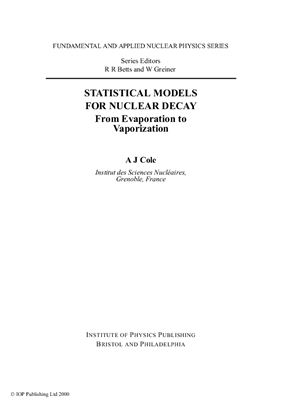Taylor & Francis, IOP Publishing Ltd, 2000, 349 pages
Statistical Models for Nuclear Decay: From Evaporation to Vaporization describes statistical models that are applied to the decay of atomic nuclei, emphasizing highly excited nuclei usually produced using heavy ion collisions. The first two chapters present essential introductions to statistical mechanics and nuclear physics, followed by a description of the historical developments, beginning with the application of the Bohr hypothesis by Weisskopf in 1937. This chapter covers fusion, fission, and the Hauser-Festbach theory. The next chapter applies the Hauser-Festbach theory using Monte Carlo methods and presents important experimental results. Subsequent chapters discuss nuclear decay at high excitation energies, including the theories and experimental results for sequential binary division, multifragmentation, and vaporization. The final chapter provides a short summary and discusses possible paths for further research.
Statistical Models for Nuclear Decay: From Evaporation to Vaporization describes statistical models that are applied to the decay of atomic nuclei, emphasizing highly excited nuclei usually produced using heavy ion collisions. The first two chapters present essential introductions to statistical mechanics and nuclear physics, followed by a description of the historical developments, beginning with the application of the Bohr hypothesis by Weisskopf in 1937. This chapter covers fusion, fission, and the Hauser-Festbach theory. The next chapter applies the Hauser-Festbach theory using Monte Carlo methods and presents important experimental results. Subsequent chapters discuss nuclear decay at high excitation energies, including the theories and experimental results for sequential binary division, multifragmentation, and vaporization. The final chapter provides a short summary and discusses possible paths for further research.

